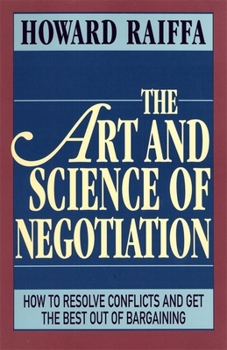The Art and Science of Negotiation
Select Format
Select Condition 
Book Overview
Whether you are selling a house, closing a business deal, settling a divorce, arbitrating a labor dispute, or trying to hammer out an international treaty, Howard Raiffa's new book will measurably improve your negotiating skills.
Format:Paperback
Language:English
ISBN:067404813X
ISBN13:9780674048133
Release Date:March 1985
Publisher:Belknap Press
Length:384 Pages
Weight:1.30 lbs.
Dimensions:1.0" x 6.1" x 9.2"
Customer Reviews
5 ratings
A good college text on negotiation
Published by Thriftbooks.com User , 20 years ago
Howard Raiffa is a professor at Harvard Business School who has a background in game theory and competitive decision making skills. He is also affiliated with the Harvard Program on Negotiation [website]. I was first exposed to this text in a Harvard symposium on collaborative negotiation that I attended 10 years ago. Raiffa's book is a popular text for academics who are interested in negotiation skills.In this book, Raiffa likes to distinguish between the "art" of negotiation and the "science" of negotiation. By "art of negotiation" Raiffa means dealing with the human element. By "science" Raiffa means those aspects of the negotiation process that are capable of being analyised in a fairly structured manner. Raiffa devotes most of this book on the "science" of the subject and uses his background as a game theorist specializing in competitive decision making as the basis for a rather analytical approach to the subject. It helps, but is not necessary, if you have a background in mathematics. If you are not math literate, skip the math and focus on the conclusions and you will do fine. Like most game theorists, Raiffa is mainly interested in determining which outcomes to negotiation are optimal for both parties. Much of his analysis is based on the premise that both parties will act in an ultimately rational manner and make decisions that will be optimal for themselves. (Note to game theorists- most of Raiffa's analysis tends to focus on the various "equilibrium points" that parties have when they negotiate.) Of course, reality is somewhat different. Real life does not lend itself easily to mathematical models. People usually act irrationally when they negotiate and it is difficult, if not impossible, to quantify human emotions with a formula.Nevertheless, this book is useful for people who want an analytical approach--as opposed to strategic and tactical approach-- to the subject of negotiation. The subtitle of the text ("How to resolve conflicts and get the best out of bargaining") is a little misleading. There is not much "how to" covered in this text. Rather the emphasis is on theory and analysis.
A substantive book on negotiation
Published by Thriftbooks.com User , 23 years ago
This book is the best book on the subject, but it is not for wimps. If you want something with the shallowness of "Who Moved My Cheese?" this book is not for you. Most college programs on negotiation use Raiffa's texts and this is the best of the lot.
A must read for serious students or practitioners
Published by Thriftbooks.com User , 24 years ago
Howard Raiffa is one of the few authors of negotiation related books who combines expertise in both theory and practice of negotiations. While a bit heavy-reading for the beginner, any serious student or practitioner in the art of negotiation will find this book both thought provoking and extremely useful. I highly recommend it (I give the book as a gift to many colleagues).
Essential reading for the specialist
Published by Thriftbooks.com User , 25 years ago
While this is not a good intro into the field of negotiation analysis, Raiffa's work is indispensible for the sophisticated specialist. It takes a rigorous quantitiative approach that goes deeper on the collaborative approach set out in "folksier" books like Getting to Yes. Some readers might not follow all the math, but the good news is that the chapters are very independant of each other. If you don't get anything out of one, you will out of the next.
The classic of negotiation theory
Published by Thriftbooks.com User , 27 years ago
A must read for students of negotiation, including anyone who is, or hopes to become, an executive. The basis of many courses on negotiation and decision science. Raiffa spent 30 years developing his views, and they are rock solid. Treats the concepts of Pareto optimization and allocation of joint gains. In one eye-opening passage, he examines how an arbitrator might allocate $100 between a rich man and a poor man. The range of alternatives is mind boggling, and depressing, for it becomes clear that here, alas,(as with atomic physics) there is no "truth."




